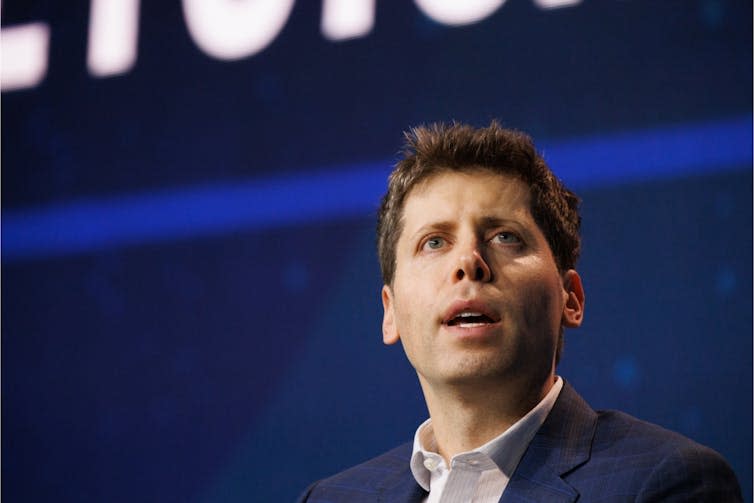A global race to build powerful computer chips essential for the next generation of artificial intelligence (AI) tools could have a major impact on global politics and security.
The US is currently the leader in the design of these chips, also called semiconductors. But most of the production takes place in Taiwan. The debate has been sparked by Sam Altman, CEO of ChatGPT’s developer OpenAI, calling for a global investment of $5 to $7 trillion to produce more powerful chips for the next generation of AI platforms. .
The amount of money Altman asked for is more than the chip industry has spent in total since its inception. Whatever the facts about these numbers, the overall projections for the AI market are staggering. Data analytics company GlobalData predicts the market will be worth $909 billion by 2030.
Not surprisingly, over the past two years the US, China, Japan and several European countries have increased their budget allocations and taken measures to secure or retain a share of the chip industry for themselves. China is catching up quickly, subsidizing chips, including next-generation ones for AI, by hundreds of billions over the next decade to build a manufacturing supply chain.
Subsidies also seem to be the preferred strategy for Germany. The UK government has announced plans to invest £100 million to support regulators and universities in tackling challenges around artificial intelligence.
Economic historian Chris Miller, the author of the book Chip War, has spoken about how powerful chips have become a “strategic asset” on the global geopolitical stage.
Despite efforts by several countries to invest in the future of chips, there is currently a shortage of the types currently needed for AI systems. Miller recently explained that 90% of the chips used to train or improve AI systems are produced by just one company.
That company is the Taiwan Semiconductor Manufacturing Company (TSMC). Taiwan’s dominance in the chip industry is notable because the island is also the focus of tensions between China and the US.
Read more: The microchip industry would implode if China invaded Taiwan, and it would affect everyone
Taiwan has been largely independent since the mid-20th century. However, Beijing believes it must be reunited with the rest of China and US law requires Washington to help defend Taiwan if it is invaded. What would happen to the chip industry in such a scenario is unclear, but it is clearly a concern for global concern.
The disruption of chip manufacturing supply chains has the potential to bring entire industries to a standstill. Access to raw materials, such as rare earth metals, used in computer chips has also proven to be a major bottleneck. For example, China controls 60% of gallium metal production and 80% of global germanium production. These are both crucial raw materials used in the production of chips.

And there are even more, lesser-known bottlenecks. A process called extreme ultraviolet (EUV) lithography is critical to the ability to make computer chips increasingly smaller and therefore more powerful. One company in the Netherlands, ASML, is the only manufacturer of EUV systems for chip production.
However, chip factories are increasingly being built outside Asia – something that has the potential to reduce over-reliance on a few supply chains. Plants in the US are subsidized to the tune of $43 billion and in Europe to the tune of $53 billion.
For example, Taiwanese semiconductor manufacturer TSMC plans to build a multibillion-dollar factory in Arizona. When the factory opens, it will not produce the most advanced chips currently possible, many of which are still produced by Taiwan.
Moving chip production outside of Taiwan could reduce the risk to global supplies in the event that production is somehow disrupted. But it could take years for this process to have a meaningful impact. It is perhaps not surprising that this year’s Munich Security Conference devoted a chapter to technology as a global security issue for the first time, with a discussion on the role of computer chips.
Broader issues
Of course, the demand for chips to fuel AI growth isn’t the only way artificial intelligence will have a major impact on geopolitics and global security. The growth of misinformation and misinformation online has transformed politics in recent years by inflaming biases on both sides of debates.
We have seen it during the Brexit campaign, during the US presidential election and, more recently, during the conflict in Gaza. AI could be the ultimate amplifier of disinformation. Take deepfakes, for example: AI-manipulated videos, audio or images of public figures. These can easily fool people into thinking that a major political candidate said something they did not say.
In a sign of the growing importance of this technology, twenty of the world’s largest technology companies launched something called the “Tech Accord” at the 2024 Munich Security Conference. In it, they pledged to work together to create tools to detect, label and unmask deepfakes.
But should such important issues be left to technology companies to police? Mechanisms such as the EU’s Digital Service Act, the British Online Safety Bill and frameworks to regulate AI itself should help with this. But it remains to be seen what impact they can have on the problem.
The issues raised by the chip industry and the growing demand driven by the growth of AI are just one way AI is driving change on the global stage. But it remains a crucial issue. National leaders and authorities should not underestimate the influence of AI. Its potential to redefine geopolitics and global security would exceed our ability to predict and plan for the changes.
This article is republished from The Conversation under a Creative Commons license. Read the original article.


Alina Vaduva is affiliated with the Labor Party, as a member and elected councilor in Dartford, Kent.
Kirk Chang does not work for, consult with, own stock in, or receive funding from any company or organization that would benefit from this article, and has disclosed no relevant affiliations beyond their academic appointment.